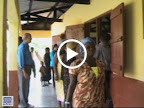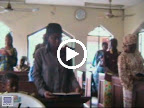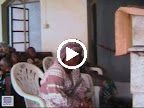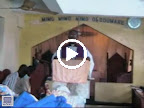Sunday, November 23, 2008
Unitarian worship in Lagos
The Children we have seen on our journey
 Today we attended church at the Brotherhood Unitarian Church in Lagos, Nigeria. This is a Unitarian church that was started in 1918 on an island in Lagos, which is the oldest part of the city. This was our first opportunity to closely observe children with their parents. On other occasions we have seen children in different schools in Uganda, Kenya, and Ghana and once in Uganda we saw children in an orphanage. I was happy to see that today the children we saw were a bit more like children in the U.S. Although they were very well behaved, sitting through the whole church service which was twice as long as a typical UU service in America, they were occasionally "figgety" and even feisty with each other and the parents were sometimes a bit fussy with them as well.
Today we attended church at the Brotherhood Unitarian Church in Lagos, Nigeria. This is a Unitarian church that was started in 1918 on an island in Lagos, which is the oldest part of the city. This was our first opportunity to closely observe children with their parents. On other occasions we have seen children in different schools in Uganda, Kenya, and Ghana and once in Uganda we saw children in an orphanage. I was happy to see that today the children we saw were a bit more like children in the U.S. Although they were very well behaved, sitting through the whole church service which was twice as long as a typical UU service in America, they were occasionally "figgety" and even feisty with each other and the parents were sometimes a bit fussy with them as well.I had no idea what the children we would meet on our trip would be like. We have all seen those television ads for organizations who are trying to "save the chilren" of Africa. But, I didn't know what to expect. I have been pleasantly surprised to find the children we have seen to be much healther than any children depicted on television. They have looked healthy and well cared for. Maybe a few had running noses, but those were the exception. For the most part the children we saw at each of the schools were wearing uniforms. Almost all the children we have seen at various schools, as we have driven through their villages, were wearing uniforms and the uniforms were all different colors, not the navy jumpers and shorts with white shirts I have seen in other places.
It has been quite something to see the level of education these children have demonstrated, singing to us in their own language and then switching easily to English. Today, while driving to the church, 'Femi Matimoju's 7-year old son, read us a short book in English. His mother said that both he and his 5-year old sister are learning English and French in school, as well as Yoruba their native language.
I don't know what their school looks like, but the ones we have seen on our trip have been very, very bare by U.S. standards. They have had narrow benches to sit on and if they were really lucky they had a bench to use as a desk. Only one school we saw had desks for the students and even those were used by two children at a time.
We, Americans, have so much. And UU's in particular have so much and care so much about educating our children. All of us on this pilgrimage are committed to inspiring support for the schools we've visited and the children we've met. In fact, our hearts go out to them. Opportunities to provide support are in development. Let's all be as generous as possible.
Friday, November 21, 2008
African tips

South African Rands, Ugandan and Kenyan Shillings (different from each other), Senegalese Francs, Ghanaian Cedis, and Nigerian Nairas--In 20 days we will have managed six different African currencies and exchange rates. How much and whom do you tip?
How many times have you asked yourself, “How much tip should I give?” Whether at home in the states or traveling abroad, tipping people for their services is sometimes the completion of the transaction. And whom should you tip? For example, do you tip everyone who touches your bags? I do feel bad for the porters and others who are used to making money carrying bags for travelers. The brilliant invention of the suitcase with wheels has practically put them out of business. And, airlines that charge passengers for curbside check-in have further cut into the money that porters make. Who pays the airline fee and then tips the porter too? But now-a-days having wheels simplifies the matter: it’s easy to avoid offers to help with our bags altogether and so the question of the tip doesn’t come up.
How about restaurants and room service? Are service charges included on the bill and does that suffice for the tip or do you give a tip to the person who waits on you in addition to the fees presented on the bill?
And chamber maids or housekeepers? Do you leave a tip for them? If so, how much? Taquiena Boston, Director of Identity-based Ministries, and I have an agreement (one that I think she and Meg Riley, Director of Advocacy and Witness, share) for tipping the people-usually women- who clean our rooms. In the spirit of social and economic justice, we leave a tip and we do so each day rather than waiting until check-out. It seems to make sense and it is fair to the staff in that it takes into consideration that there may be different people cleaning the room each day.
Tipping daily becomes a practice of mindfulness. It means remembering and having the right bills each day for leaving at least three dollars per hotel registrant each morning before heading out for the day’s activities.
When our scuba diving club travels annually on a two week trip to somewhere where the weather is warm, my husband always suggests that travelers prepare by going to the bank and getting $100 one-dollar bills. Club members are happy to tip knowing that our travel business enhances the local economy and usually the people who work in these service jobs are people of color. We also see ourselves as ambassadors and the impressions we leave influence the way local people remember our club, African Americans in the states, and Americans in general.
My conscious has grown over the question of tipping. One day while working in downtown Washington, DC, standing in my business suit with briefcase in hand, I hailed a taxi. An elderly African American man stopped his cab and drove me to my destination. I asked how much I owed, calculated 15% exactly for the tip and handed him the money. I heard him say as I was leaving the cab, “It figures.” A sense of regret followed me out of the cab and hung around for a long time dissolving some of my business naïveté. I started using 15% as my minimum tip rather than “the tip.”
Since then, my daughter has been employed in the service industry. Waitressing and bartending have been decent paying jobs with flexible hours allowing her to earn money while she is in college. She has taught me well when it comes to tips. Some wait staff only get paid a few dollars per hour because they make their money on our tips. They also have to “tip out”—share percentages of their money—with other staff members. In some cases all of the money is put in the pot and divided at the end of the shift. ; If not for her, I would have never known all of this.
When she and I go out for a meal, I often pass her the bill and let her decide how much we will pay for the tip. We never disagree. At the end of her work day when I ask if she had a good day, we understand that part of the question is: “Did you make good tips?” Even when the work is not so enjoyable, good tips can make it more bearable. Now she works in a place that she loves and even if the tips are not great, there are other things that keep her committed to her place of employment.
On this journey with many stops, it has been challenging to be mindful enough to exchange money before going to my room. That means I have not been very good at my practice of l eaving daily tips. In Soweto after two nights at the Holiday Inn, I left a good tip in the room on check-out day. After our morning site visit, we returned to the hotel to get our luggage before going to the airport. A front desk employee called me over to tell me I had left my money in the room. I smiled and told her that it was a tip for the staff. She thanked me with a smile.
It is possible that for people who work directly with customers in the service industry, our tips might help them to get ahead in life. At the end of this writing I am going down to the hotel desk to exchange some US dollars for francs so that I will have money to leave when we check out in the morning.
Every Child is Our Child
Since 2004 the Unitarian Universalist United Nations Office (UU-UNO) has had a partnership with the Manya Krobo Queen Mothers Association of the Eastern Region of Ghana to support the education of children orphaned by HIV/AIDS. In 2008, 160 children ranging from primary through junior high school in three schools near Odumase, Ghana are benefitting from this support.
President Sinkford and his companions were joined by UU-UNO Executive Director, Bruce Knotts, as we visited the Queen Mothers, the traditional Chief of the Manya Krobo, and the three schools involved in the project. It was an amazing blessing to meet the children involved in the "Every Child is Our Child" program.
Below are a few video clips from our visits:

Meeting with the Manya Krobo chief

At a primary school in Okwenya

Meeting with Teachers and Queen Mothers

a presentation by Fasu Grace

a presentation by Ruth Knwornu

a presentation by Dapa'ah Susuana

The Queen Mothers lead dancing

A final word from Rev. Sinkford
President Sinkford and his companions were joined by UU-UNO Executive Director, Bruce Knotts, as we visited the Queen Mothers, the traditional Chief of the Manya Krobo, and the three schools involved in the project. It was an amazing blessing to meet the children involved in the "Every Child is Our Child" program.
Below are a few video clips from our visits:

Meeting with the Manya Krobo chief

At a primary school in Okwenya

Meeting with Teachers and Queen Mothers

a presentation by Fasu Grace

a presentation by Ruth Knwornu

a presentation by Dapa'ah Susuana

The Queen Mothers lead dancing

A final word from Rev. Sinkford
Subscribe to:
Posts (Atom)











